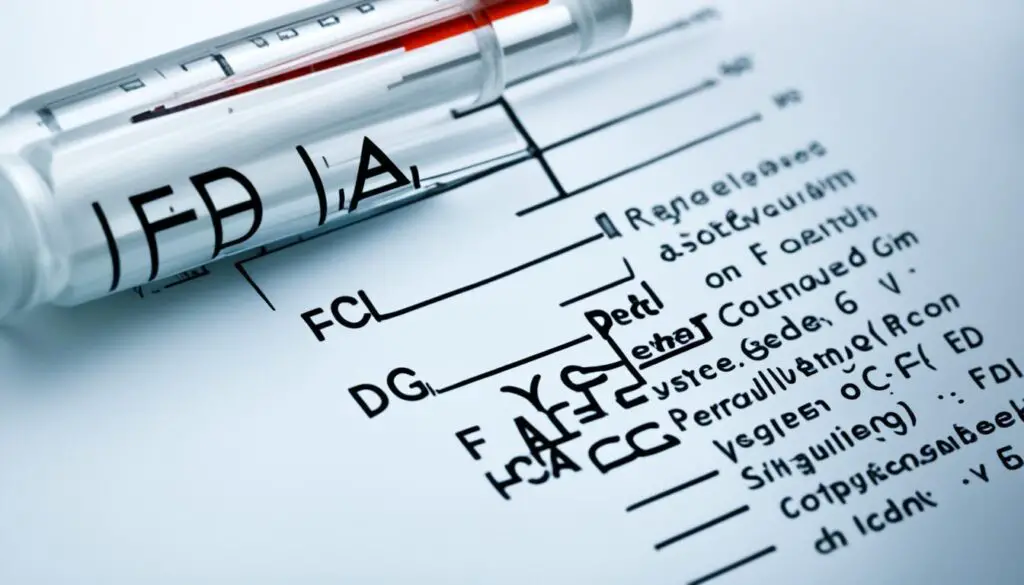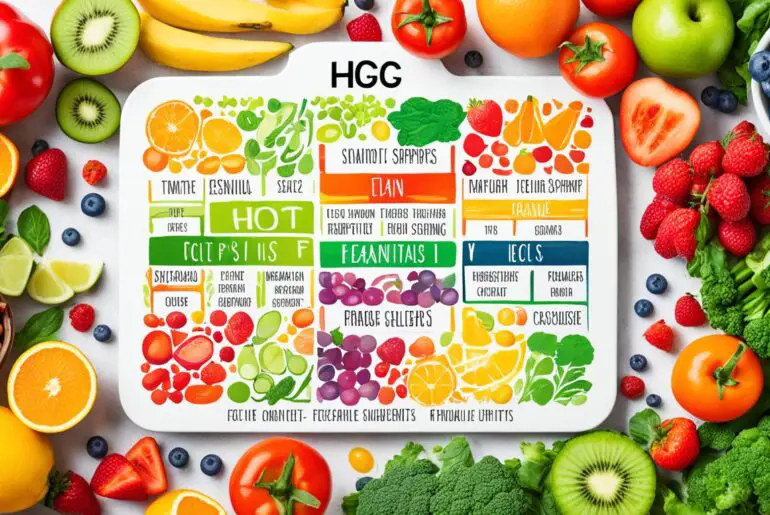Did you know that the HCG diet, a popular weight loss method, promotes severe calorie restriction and involves injections of the hormone human chorionic gonadotropin (HCG)? It may come as a surprise that this diet lacks scientific evidence and poses significant safety concerns.
Key Takeaways:
- The HCG diet combines severe calorie restriction with HCG injections, but there is no scientific evidence to support its effectiveness or safety.
- The FDA does not consider HCG supplements safe for weight loss, and over-the-counter HCG products are illegal.
- Safety concerns of the HCG diet include gallstone formation, irregular heartbeat, nutrient deficiencies, electrolyte imbalances, and the potential for blood clots.
- Consulting with a healthcare professional is essential for safer and more sustainable weight loss options.
- The HCG diet is not recommended due to its lack of scientific evidence, potential risks, and the importance of prioritizing long-term health.
The History and Claims of the HCG Diet
The HCG diet has a long and controversial history that dates back to the early 1950s. It was popularized by British physician Albert Simeons, who claimed that injecting the hormone HCG could lead to rapid weight loss by targeting stored body fat instead of muscle mass.
Despite these claims, there is no scientific evidence to support the effectiveness of the HCG diet for weight loss. In fact, the Food and Drug Administration (FDA) has not approved the use of HCG for this purpose. The diet’s promises of significant weight loss, testimonials, and claims of metabolic reset and fixing “abnormal eating patterns” have not been backed by scientific research or regulatory approval.
Many proponents of the HCG diet have shared glowing testimonials of their success with the program. However, it is essential to approach these testimonials with caution, as individual experiences may not reflect the overall effectiveness or safety of the diet.
“I lost 30 pounds in just one month with the HCG diet!” – Testimonial from a HCG diet participant
While testimonials can be compelling, they do not constitute scientific evidence and should not be relied upon as such. It is important to consider the larger body of scientific research and expert opinions when evaluating the validity of weight loss programs.
| Claims of the HCG Diet | Effectiveness of the HCG Diet |
|---|---|
| Significant weight loss | Lack of scientific evidence |
| Metabolic reset | Inconclusive research |
| Fixing “abnormal eating patterns” | Limited long-term success |
The claims of the HCG diet may sound enticing, but it is important to critically evaluate the available evidence. As of now, there is no scientific consensus on the effectiveness of the HCG diet for long-term weight loss or overall health improvement.
In conclusion, the history of the HCG diet is fraught with unfounded claims and controversial practices. Despite testimonials and promises of significant weight loss, the effectiveness of the HCG diet remains unproven.
The Safety Concerns of the HCG Diet
The HCG diet poses several safety concerns. Severe calorie restriction, which is a key component of the diet, can lead to nutrient deficiencies, fatigue, irritability, depression, and an increased risk of gallstones.
The use of HCG injections or supplements can result in side effects such as fluid buildup, enlarged breasts in males, blood clots, and allergic reactions. These potential complications can have serious health implications and should not be taken lightly.
Furthermore, the long-term effects of the HCG diet are unknown as the use of HCG for weight loss has not been scientifically proven and may have detrimental effects on metabolism and hormone levels. It is crucial to understand that the safety and efficacy of the HCG diet have not been substantiated by scientific research or regulatory approval.
Registered dietitians and healthcare professionals unanimously agree that the HCG diet is dangerous and should not be recommended. The risks and dangers associated with the HCG diet outweigh any potential benefits and individuals should consider safer and more sustainable weight loss options.
It is important to prioritize your health and consult with a healthcare professional before embarking on any weight loss program, especially those that involve severe calorie restriction and the use of hormone supplements or injections. Safety should always be the top priority when making decisions about your diet and well-being.
Lack of Scientific Evidence and FDA Regulation

When it comes to the HCG diet, there is a lack of scientific evidence to support its effectiveness as a weight loss method. Numerous studies have shown that the HCG hormone does not have any significant effects on weight loss, fat redistribution, or hunger reduction. Despite the widespread popularity of the diet, there is simply no credible scientific basis to support its claims.
The Food and Drug Administration (FDA) has also taken a stance on the HCG diet, strictly regulating its use and issuing warnings against the use of over-the-counter HCG products. The FDA does not consider HCG supplements safe for weight loss, and selling over-the-counter HCG products for this purpose is illegal and violates FDA regulations. It is worth noting that the FDA has only approved HCG as a prescription medication for treating fertility issues and hormone problems.
The lack of scientific evidence and FDA regulation raises serious concerns about the safety and efficacy of the HCG diet. It is crucial for individuals considering this diet to be aware of the potential risks and to consult with a healthcare professional before embarking on any weight loss program.
Moreover, using HCG for weight loss without proper medical supervision can have serious adverse effects. It is always important to prioritize your health and choose weight loss options that are supported by scientific evidence and overseen by healthcare professionals.
The FDA-approved uses of HCG
While the FDA does not endorse the use of HCG for weight loss, it does acknowledge its approved uses in specific medical contexts. HCG is a prescription medication primarily used to treat fertility issues and hormone problems. It is administered under the supervision of healthcare professionals and is not intended for self-administration or use as a weight loss method.
| FDA-Approved Uses: |
|---|
| 1. Fertility treatment in women |
| 2. Hormone-related menstrual disorders |
| 3. Undescended testicles in young males |
As demonstrated by the FDA-approved uses of HCG, its intended application is far removed from weight loss. It is essential for individuals to be cautious of unsubstantiated claims and to rely on credible medical advice when considering any form of treatment.
Risks of Very Low-Calorie Diets and Potential Consequences
The HCG diet involves severely restricting calorie intake to around 500 calories per day, which is considered a very low-calorie diet (VLCD). VLCDs may promote short-term weight loss, but they pose risks for nutrient deficiencies, muscle loss, irregular heartbeat, electrolyte imbalances, and other adverse effects.
The severe calorie restriction of the HCG diet limits the intake of essential nutrients from various food groups, leading to potential deficiencies in vitamins, minerals, and other important macro- and micronutrients. This can increase the risk of developing other health conditions such as cancer, diabetes, and heart disease.
To highlight the potential consequences of very low-calorie diets, it is crucial to understand the importance of a balanced and sustainable weight loss plan. Severe calorie restriction can deprive the body of necessary nutrients, leading to imbalances and deficiencies. This can have a detrimental impact on overall health and well-being.
While short-term weight loss may be achieved with very low-calorie diets like the HCG diet, it is essential to consider the long-term consequences. Losing weight too quickly and without proper nutrition can result in muscle loss, a slower metabolism, and an increased likelihood of regaining the lost weight.
When embarking on a weight loss journey, it is recommended to consult with a healthcare professional, such as a registered dietitian, who can provide guidance on creating a personalized and sustainable plan. This includes incorporating a variety of nutrient-dense foods, maintaining adequate calorie intake, and engaging in regular physical activity to support overall health and weight management.
The Risks of Very Low-Calorie Diets:
- Nutrient deficiencies: Severe calorie restriction limits the intake of essential vitamins, minerals, and other nutrients, increasing the risk of deficiencies and related health issues.
- Muscle loss: Very low-calorie diets can cause the body to break down muscle tissue for energy, leading to muscle loss and a slower metabolism.
- Irregular heartbeat: Severe calorie restriction can disrupt the normal functioning of the heart, potentially leading to irregular heart rhythms.
- Electrolyte imbalances: Inadequate intake of essential electrolytes, such as sodium, potassium, and magnesium, can lead to imbalances that affect various bodily functions.
It is important to prioritize long-term health over short-term weight loss goals. Sustainable weight loss involves adopting healthy eating habits, regular physical activity, and a balanced approach that does not overly restrict calories or essential nutrients.
| Health Risks of Severe Calorie Restriction: | Potential Consequences of Nutrient Deficiencies: |
|---|---|
| – Muscle loss | – Weakened immune system |
| – Slower metabolism | – Fatigue and low energy levels |
| – Gallstone formation | – Impaired cognitive function |
| – Irregular menstrual cycles | – Increased risk of chronic diseases |
Conclusion
After a thorough examination of the HCG diet and its safety concerns, it is evident that this weight loss method is not a recommended option. The lack of scientific evidence supporting its effectiveness, combined with FDA warnings and potential risks, make the HCG diet potentially dangerous and harmful to one’s health.
It is important to prioritize health and consider safer and more sustainable weight loss alternatives. Consulting with a healthcare professional can provide valuable guidance and personalized recommendations that align with an individual’s specific needs and goals.
While restrictive diets like the HCG diet may lead to short-term weight loss, they are unlikely to result in long-term success. Sustainable weight loss requires making healthy lifestyle changes, including adopting a balanced diet and engaging in regular exercise. These changes not only support weight management but also contribute to overall well-being.
FAQ
What is the HCG diet?
The HCG diet is a weight loss method that involves combining hormone supplements or injections of human chorionic gonadotropin (HCG) with severe calorie restriction.
Is the HCG diet safe?
The HCG diet poses several safety concerns. Severe calorie restriction can lead to nutrient deficiencies and other risks, and the use of HCG injections or supplements can have side effects and potential long-term health risks.
Is there scientific evidence to support the HCG diet?
No, there is no scientific evidence to support the use of HCG for weight loss. Multiple studies have shown that the HCG hormone does not have any effects on weight loss, fat redistribution, or hunger reduction.
Is it legal to use HCG for weight loss?
No, the FDA does not consider HCG supplements safe for weight loss, and the sale of over-the-counter HCG products for weight loss is illegal and violates FDA regulations.
What are the risks of very low-calorie diets like the HCG diet?
Very low-calorie diets can lead to nutrient deficiencies, muscle loss, irregular heartbeat, electrolyte imbalances, and other adverse effects. They also increase the risk of developing other health conditions such as cancer, diabetes, and heart disease.
What are the potential consequences of the HCG diet?
The potential consequences of the HCG diet include gallstone formation, irregular heartbeat, nutrient deficiencies, electrolyte imbalances, and the potential for blood clots.
What are safer and more sustainable weight loss options?
It is important to consult with a healthcare professional for safer and more sustainable weight loss options, as the HCG diet is not recommended. Registered dietitians and healthcare professionals can provide guidance on balanced and sustainable weight loss plans.




